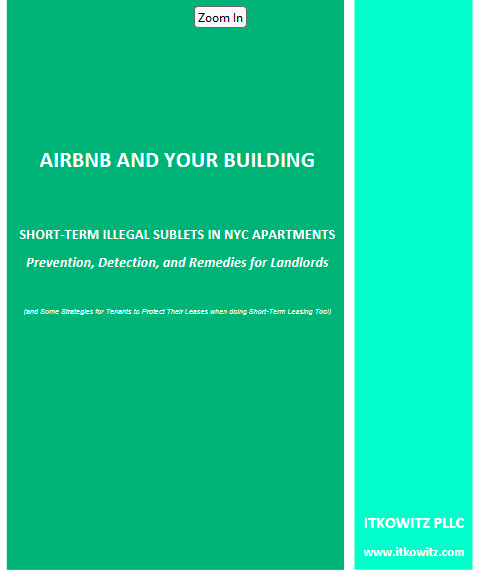Short-Term Illegal Sublets in NYC Apartments — Prevention, Detection, and Remedies for Landlords
October 4, 2016
On September 27, 2016, Michelle Maratto Itkowitz appeared at the Sublet Spy Symposium. Below is an excerpt from her new and original material on how to prevent, detect, and deal with Illegal Short-Term Sublets in NYC Apartments.
 |
| Michelle Itkowitz presenting. |
Materials Except
IV. “PROFESSIONAL OPERATORS” — NOT REGULAR FOLKS ENGAGING IN THE “SHARING ECONOMY” — AND AN EVEN BIGGER PROBLEM FOR LANDLORDS AND OTHER TENANTS OF THE BUILDING
At this point, when a landlord calls me about an Airbnb problem in her or his building, my first question is this – am I dealing with real human beings attempting to engage in the “sharing economy” or am I dealing with a de facto hotelier, a “professional operator” – someone who rents a whole bunch of apartments, which he or she never lives in, and which he or she illegally short-term sublets continuously.
According to the office of the New York State attorney general, Eric T. Schneiderman, almost half of Airbnb’s $1.45 million in 2010 revenue in the city came from hosts who had at least three listings on the site. An analysis of global Airbnb listings [in 2014] showed that hosts offering multiple listings made up over 40% of the company’s business. A 2016 report from Penn State researchers for the American Hotel and Lodging Association determined that $378M of Airbnb’s total revenue—nearly 30%—was generated from “full-time operators” listing rentals year-round.
Dealing with a professional operator is completely different from dealing with a regular person. I had a client recently who discovered that one of his tenants, let’s call him “John”, had rented three apartments in the building, using his wife’s name for one unit and his friend’s name for another. John did not live in any of the three units and all three were continuously rented on Airbnb. The landlord was furious. When he confronted John, John said, “When the Marshal comes, I will stop. I have a lawyer and have been in this situation before.” The landlord then made a terrible mistake – (without consulting a lawyer) he hired a security guard to prevent guests of the three units from entering. John took the landlord immediately to court on three illegal lockout proceedings and won. You can never use self-help eviction against a residential tenant in New York City. You can NOT lock a tenant out of their apartment. In New York State, in the context of a residential lease, a landlord is forbidden from resorting to self-help under any circumstances and can be subject to compensatory, punitive, and treble damages. See Real Property Actions and Proceedings Law (“RPAPL”) § 853; Romanello v. Hirschfeld, 63 N.Y.2d 613, 615 (1984).
***
Professional operators will only go when a Marshall comes to the door. Therefore, for Professional Operators may justify the expense of seeking an injunction.
Injunctive relief is available to a landlord when a tenant violates the short term leasing laws. Brookford v. Penraat 47 Misc 3d 723 (S. Ct. NY Co. 2014) involved an action commenced by plaintiff-landlord against defendant-tenant, the resident of a four-bedroom, rent-controlled duplex apartment on Central Park West, arising out of tenant’s rental of three of the bedrooms to tourists and other transient visitors for profit on a short-term basis using a commercial website. Landlord was granted a preliminary injunction enjoining tenant from so renting the apartment where plaintiff demonstrated a likelihood of success on the merits of its claim that defendant’s activities were in violation of Multiple Dwelling Law § 4(8)(a), and where the circumstances of such renting posed a danger to all occupants of the building the court stated:
“As to whether plaintiff suffered from irreparable injury, case law has already set forth that placing tourists in accommodations that are not designed or equipped with sufficient fire and safety protections, in and of itself, constitutes irreparable injury, and the equities lie in favor of enjoining such conduct, “rather than in allowing said business to continue to operate (to defendants’ presumed financial advantage)”.”






